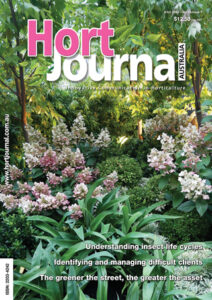Doing our bit for the environment
You may have noticed that over the past year we have included articles that cover environmental issues and sustainability from plastic recycling to landfills. If you haven’t read any of Bruce Thompson’s articles this year on recycling waste, I suggest you do. Bruce has a wealth of knowledge on this subject, and it is a topic/issue at the forefront of people’s minds with concerns about global warming and the impact it is having on our country. Australia is particularly vulnerable and we have seen the effects over the last few years with devastating fires and floods and extreme weather conditions. Coastal erosion, habitat destruction, weed and pest invasions, and damage to homes to name just a few.
Our industry, and us as individuals, can all do our bit to contribute to slowing down global warming. To begin with, we are in the business of propagating, growing and supplying or installing trees and plants, and that is something we can be proud of. Of course, one concern that many people talk about is the fact that we sell many plants in plastic containers. Fortunately, plastic recycling is happening now thanks to Garden City Plastics’ initiative which we recently wrote about.
From time to time we are asked about the impact our magazine has on the environment. We are very pleased to tell you that our magazine is printed on paper that comes from managed regrowth forests which are carefully controlled from planting to growing and harvesting. These forests are certified to comply with the world’s best practices. Managed forests take pressure off vulnerable forests and are renewable, and the paper is recyclable.
The ink that is used in the printing of Hort Journal is made from vegetable ink, another resource that is renewable and sustainable. Petroleum-based inks which come from crude oil contribute to VOC’s (volatile organic compounds) and are not good for the environment, contributing to global warming. Some petroleum-based inks are also not suitable for recycling whereas vegetable ink is fully recyclable. These facts alone make vegetable inks a much better option. Due to the colour pigments that come from vegetable ink, they also produce bright and colourful inks.
The current plastic mail-out sleeve that the magazine is posted in, is made from recyclable plastic. Woolworths and Coles have plastic recycle bins where these types of plastics can be dropped off and sent for recycling. We are however looking into a compostable wrap and we will keep you posted on that front.
On another topic, Clive Larkman has written an article in this issue about native plants and their uses in the world market for oils and edible herbs. A question that Clive asks is if others have done any breeding work in this field? If you have, can you get in touch, we would like to know and Clive would like to connect.
Come and say hello to us at the Nursery & Garden Industry Queensland Expo at the Gold Coast. We look forward to seeing you there.
Karen Smith and your Hort Journal Team

